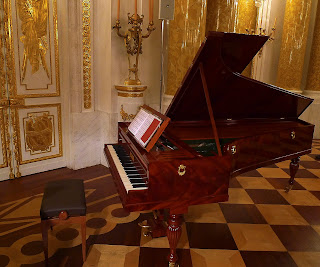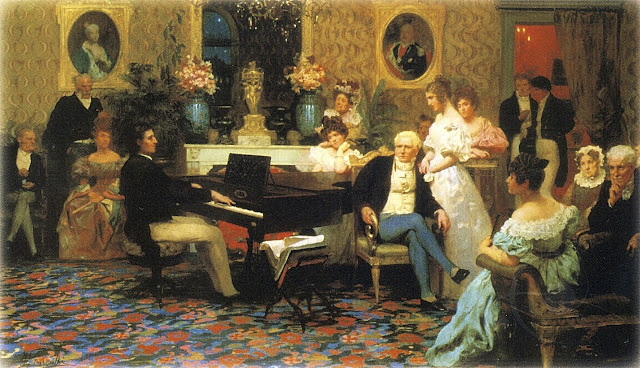The Tribute to Chopin by the Warsaw Chamber Opera (Warszawska Opera Kameralna)
 |
| Detail of the nameboard |
 |
| Ormolu decoration on the Pleyel |
I had been looking forward to Warszawka Opera Kameralna's contribution to the Chopin Year but budget cuts in May 2010 caused much of the original programme to be cancelled. Most of these involved works with orchestra. These cuts have had a serious and entirely negative effect on all privately funded and sponsored music in the capital. I had very much been looking forward to Josef Elsner's Passio Domini Nostri Jesu Christi Op. 65 (1838). This major work was only relatively recently discovered in a Berlin library. I had last heard it in the Augsburg Evangelical Church of the Holy Trinity (a superb centrally-planned Neoclassical structure in Plac Malachowskiego in Warsaw). Certainly it overturns any preconception of Elsner as a minor composer. It should be far more widely performed.
However we were treated to three excellent chamber concerts using the fine new instrument pictured above and a copy of a Conrad Graf instrument of 1819 (incidentally a favourite maker for Chopin until he encountered the instruments of Pleyel). Viviana Sofronitzki (Paul McNulty's wife) handled the Pleyel excellently and was accompanied by Sergei Istomin playing an original mid-eighteenth century cello by Leopold Widhalm. They played many of Chopin's works for piano and cello including the beautiful Sonata in G minor Op. 65. A solo recital on the Pleyel by the beautiful and sensitive pianist Natalia Pasiecznik included a group of mazurkas, the F minor Ballade and his last Nocturne in C minor. Performed in this magnificent ballroom the audience was taken back to a lost world of charm and elegance. The rarely performed Chopin Trio Op.8 was delightful and undemanding music. The proper balance of piano and strings is always enhanced and restored when a period keyboard instrument is used. The opressive dominance of the concert grand in these situations is diminished.
I had fondly anticipated the final solo recital by Janusz Olejniczak as I consider him the finest of the Polish pianists playing today. However he seemed entirely 'off' is usual poetic and restrained form and overplayed the instrument rendering the tone harsh and abrasive except in some of the more introverted lyrical moments. Leather covered hammers do not suffer physical attack well.
However you can hear him at his best on a Pleyel of 1831 in a fine rare recording.
Download free at:
http://www.box.net/shared/kxdzfyhr60
However you can hear him at his best on a Pleyel of 1831 in a fine rare recording.
Download free at:
http://www.box.net/shared/kxdzfyhr60



